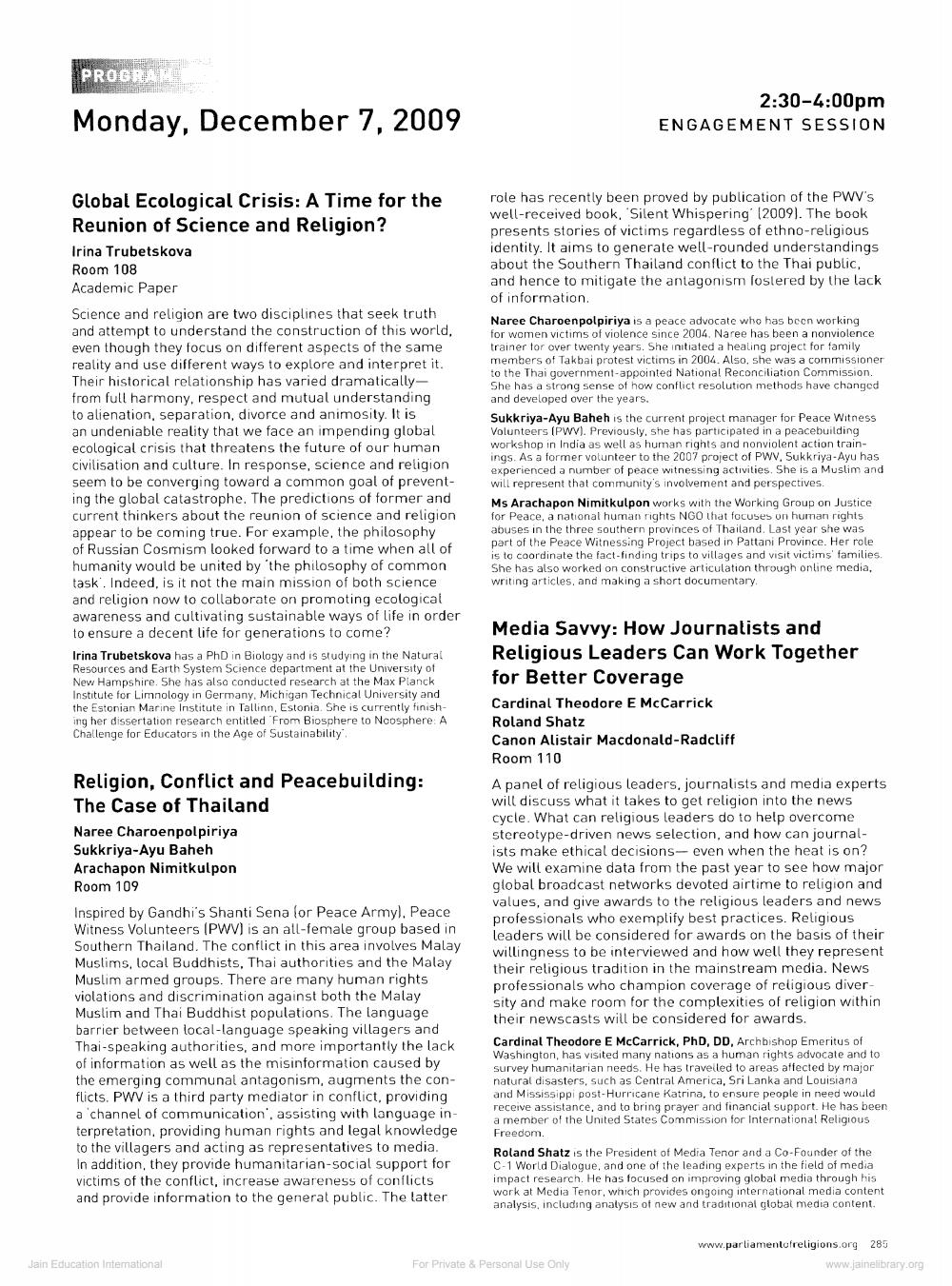________________
PROGRAR
Monday, December 7, 2009
2:30-4:00pm ENGAGEMENT SESSION
Global Ecological Crisis: A Time for the Reunion of Science and Religion? Irina Trubetskova Room 108 Academic Paper Science and religion are two disciplines that seek truth and attempt to understand the construction of this world. even though they focus on different aspects of the same reality and use different ways to explore and interpret it. Their historical relationship has varied dramaticallyfrom full harmony, respect and mutual understanding to alienation, separation, divorce and animosity. It is an undeniable reality that we face an impending global ecological crisis that threatens the future of our human civilisation and culture. In response, science and religion seem to be converging toward a common goal of preventing the global catastrophe. The predictions of former and current thinkers about the reunion of science and religion appear to be coming true. For example, the philosophy of Russian Cosmism looked forward to a time when all of humanity would be united by the philosophy of common task. Indeed, is it not the main mission of both science and religion now to collaborate on promoting ecological awareness and cultivating sustainable ways of life in order to ensure a decent life for generations to come? Irina Trubetskova has a PhD in Biology and is studying in the Natural Resources and Earth System Science department at the University of New Hampshire. She has also conducted research at the Max Planck Institute for Limnology in Germany. Michigan Technical University and the Estonian Marine Institute in Tallinn, Estonia. She is currently finishing her dissertation research entitled "From Biosphere to Ncosphere. A Challenge for Educators in the Age of Sustainability
role has recently been proved by publication of the PWV's well-received book, 'Silent Whispering (2009). The book presents stories of victims regardless of ethno-religious identity. It aims to generate well-rounded understandings about the Southern Thailand conflict to the Thai public, and hence to mitigate the antagonism fostered by the lack of information Naree Charoenpolpiriya is a peace advocate who has been working for women victims of violence since 2004. Naree has been a nonviolence trainer tor over twenty years. She initiated a healing project for family members of Takbai protest victims in 2004. Also, she was a commissioner to the Thai government-appointed National Reconciliation Commission. She has a strong sense of how conflict resolution methods have changed and developed over the years. Sukkriya-Ayu Baheh is the current project manager for Peace Witness Volunteers (PWV). Previously, she has participated in a peacebuilding workshop in India as well as human rights and nonviolent action trainings. As a former volunteer to the 2007 project of PWV, Sukkriya-Ayu has experienced a number of peace witnessing activities. She is a Muslim and will represent that community's involvement and perspectives Ms Arachapon Nimitkulpon works with the Working Group on Just for Peace, a national human rights NGO that focuses on human rights abuses in the three southern provinces of Thailand. Last year she was part of the Peace Witnessing Project based in Pattani Province. Her role is to coordinate the fact-finding trips to villages and visit victims' families She has also worked on constructive articulation through online media, writing articles, and making a short documentary
Religion, Conflict and Peacebuilding: The Case of Thailand Naree Charoenpol piriya Sukkriya-Ayu Baheh Arachapon Nimitkulpon Room 109 Inspired by Gandhi's Shanti Sena (or Peace Armyl. Peace Witness Volunteers (PWV) is an all-female group based in Southern Thailand. The conflict in this area involves Malay Muslims, local Buddhists, Thai authorities and the Malay Muslim armed groups. There are many human rights violations and discrimination against both the Malay Muslim and Thai Buddhist populations. The language barrier between local-language speaking villagers and Thai-speaking authorities, and more importantly the lack of information as well as the misinformation caused by the emerging communal antagonism, augments the conflicts. PWV is a third party mediator in conflict, providing a 'channel of communication assisting with language interpretation, providing human rights and legal knowledge to the villagers and acting as representatives to media. In addition, they provide humanitarian-social support for victims of the conflict, increase awareness of conflicts and provide information to the general public. The latter
Media Savvy: How Journalists and Religious Leaders Can Work Together for Better Coverage Cardinal Theodore E McCarrick Roland Shatz Canon Alistair Macdonald-Radcliff Room 110 A panel of religious leaders, journalists and media experts will discuss what it takes to get religion into the news cycle. What can religious leaders do to help overcome stereotype-driven news selection, and how can journalists make ethical decisions- even when the heat is on? We will examine data from the past year to see how major global broadcast networks devoted airtime to religion and values, and give awards to the religious leaders and news professionals who exemplify best practices. Religious leaders will be considered for awards on the basis of their willingness to be interviewed and how well they represent their religious tradition in the mainstream media. News professionals who champion coverage of religious diversity and make room for the complexities of religion within their newscasts will be considered for awards. Cardinal Theodore E McCarrick, PhD, DD, Archbishop Emeritus of Washington, has visited many nations as a human rights advocate and to survey humanitarian needs. He has travelled to areas affected by major natural disasters, such as Central America, Sri Lanka and Louisiana and Mississippi post-Hurricane Katrina, to ensure people in need would receive assistance, and to bring prayer and financial support. He has been a member of the United States Commission for International Religious Freedom. Roland Shatz is the President of Media Tenor and a Co-Founder of the C-1 World Dialogue, and one of the leading experts in the field of media impact research. He has focused on improving global media through his work at Media Tenor, which provides ongoing international media content analysis, including analysis of new and traditional global media content
www.parliamenlofreligions.org 285
www.jainelibrary.org
Jain Education International
For Private & Personal use only




